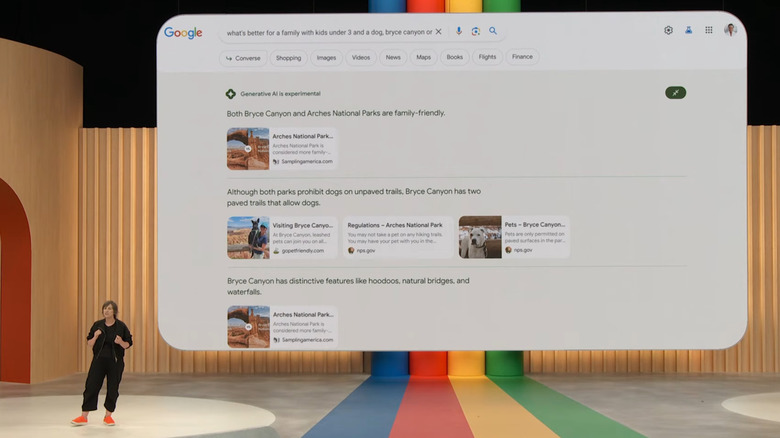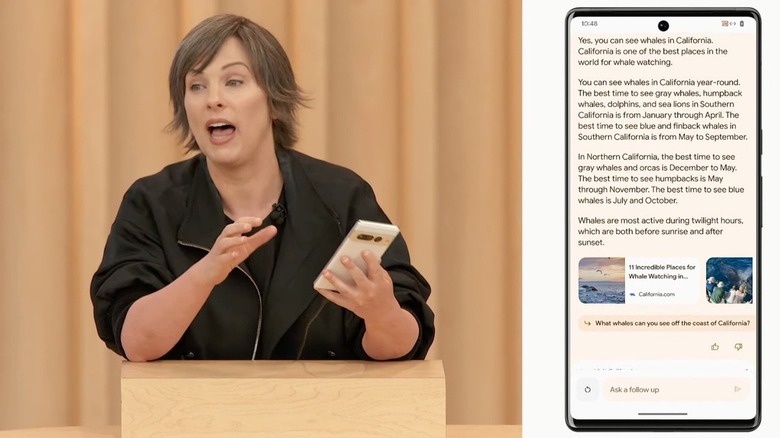This Is The AI Future Of Google Search
Artificial intelligence is going to form the backbone of search engines in times to come, and Google has demonstrated how it intends to add AI to its eponymous function. At I/O 2023, Google's Vice President of Engineering Cathy Edwards demonstrated how generative AI integration is going to make "search smarter, and searching simpler." She claims that the function will be particularly useful "when you need to make sense of something complex with multiple angles to explore."
Soon, users will have an AI panel between the sponsored results and the rest of the search results. This box contains AI's contribution to the search, and in some cases, the bulk of that will be an explanation written in a conversational style. However, there are other ways the AI will present information.
When the search topic involved shopping for a bike, the AI presented some bullet points telling the user what to consider when choosing their new ride. It also contained some links to products with pictures, brief descriptions describing each bike's merits, and pricing. The AI uses Google's shopping platform to generate the suggestions.
Users can also build on these searches with "conversational mode." The mode contains a text bar where users can ask follow up questions, and the AI will respond based on the input, what has been asked before, and the information being displayed on the page. While the search functions are at the core of the new tools, there are also a few features one might recognize from elsewhere.
It's basically Google Bard in the search box
During the demonstration, Edwards highlighted how the search function has been expanded by implementing features more closely associated with the likes of Bard or ChatGPT. This includes things like generating names for a cycling club, or write a social media post about the $4,000 e-bike Google has just sold you.
If you want to test yourself, it can generate a brief multiple-choice quiz for you, and tell you how many questions you got correct once you submit the answers. Presumably, it can also present the results in a fun way, like in the form of a haiku.
Beyond shopping, it is also helpful for finding out facts and other bits of information. During a live demonstration, it was asked why whales liked to sing: what followed was a set of bullet points explaining some of the reasons the aquatic mammals belt out a tune, followed by some helpful web links. A follow-up question was asked, and the AI pointed out some Californian whale-watching locations.
Users can apparently go off on tangents and then scroll back to previous answers to continue the conversation from there. There isn't a set date for a full release of the AI search enhancements, but the search function will be rolling out on Google's test labs in the coming weeks. Users can sign up now to get on the wait list if they would like to try the new search functions out during the experimental phase.
Inaccuracy is still an issue for Google
During the demonstration, there was a subtle yet clear warning apparent on the AI-generated sections of the search results. It read "Generative AI is experimental." This message isn't anything new: Google puts a similar disclaimer on its Bard AI's conversations, and even provides a button so you can double-check anything the AI has stated by Googling it separately.
While you should be careful about anything you read on the internet, accuracy is specifically an issue with LLM-based generative AIs for a number of reasons. Not only can it present inaccurate information to a user, but the tool can also present that information in a way that makes it sound pretty true.
In short, AI is a very convincing liar. While this tool may be useful in many ways, and accuracy will no doubt improve, you have to question if it's the right time to push this function. Google seems to have gone all out in response to Microsoft's collaboration with OpenAI and the subsequent release of the "Bing AI" chatbot.
While Google has been working on numerous AI projects for years, the sudden threat to its core product led to the company seemingly rushing out Bard in response, and putting the limitations of the Bard model on public display almost immediately. So while the new AI-powered search function may be very useful, there is still a good reason to keep scrolling and use the company's traditional search results instead.


